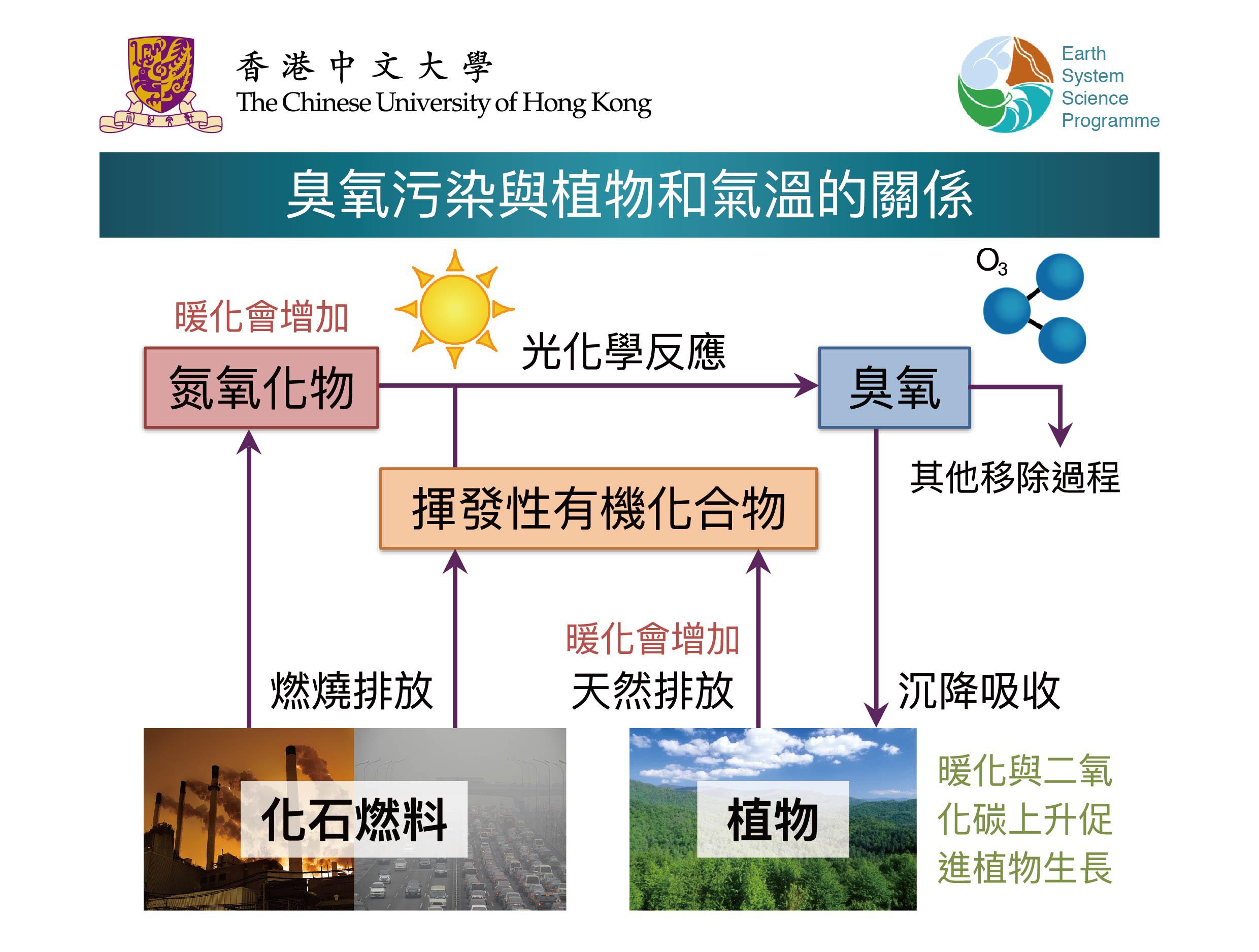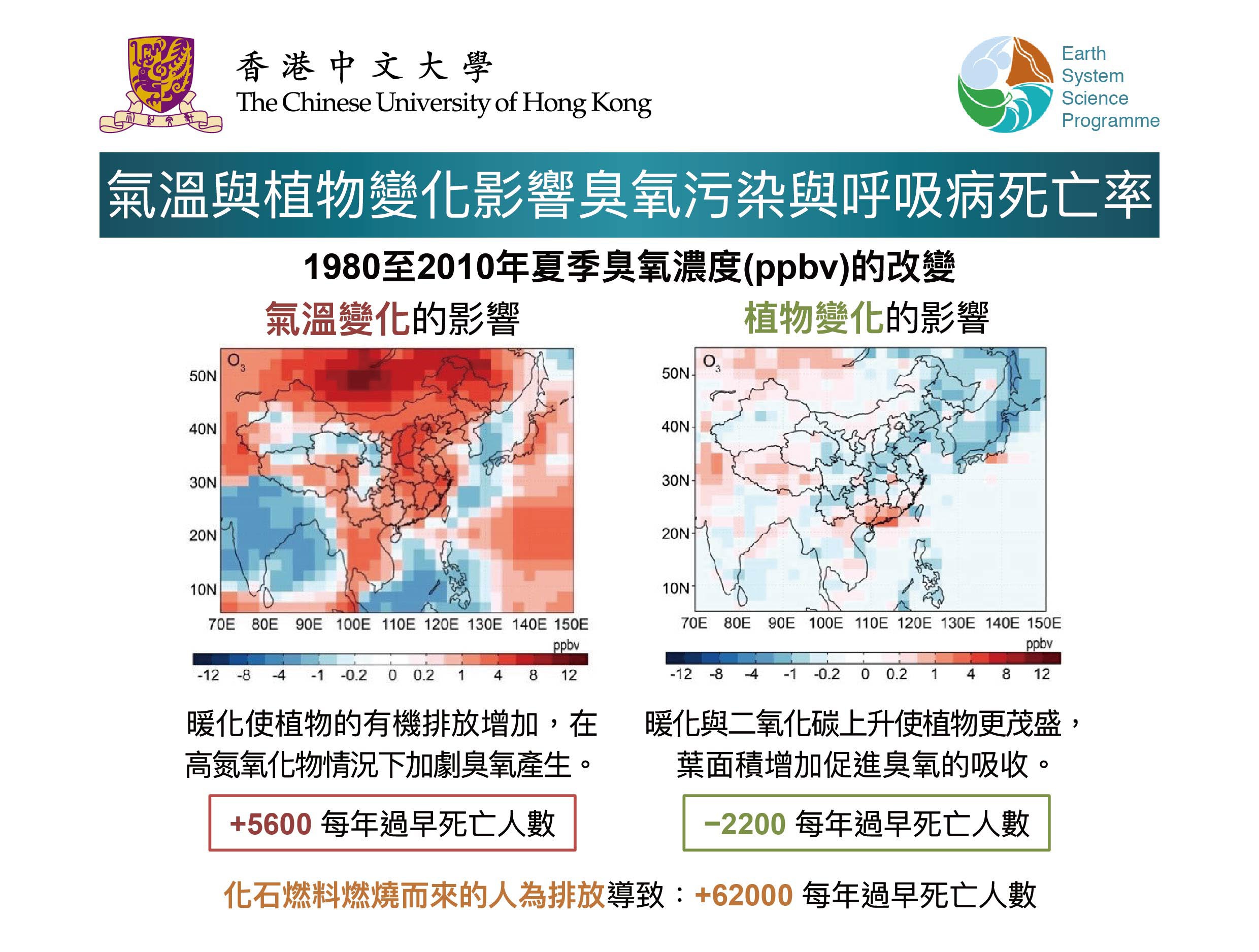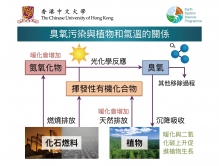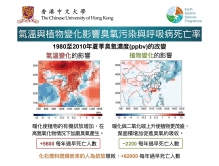CUHK
News Centre
CUHK Researcher Reveals Warming in China Contributes to More Deaths from Respiratory Diseases
Prof. Amos P.K. Tai of the Earth System Science Programme at The Chinese University of Hong Kong (CUHK) discovered in a recent study that regional warming alone in China over the past decades might have worsened surface ozone air pollution, contributing to more deaths per year from respiratory diseases. Professor Tai also found that higher vegetation density might have partially offset the adverse impact of warming. The study is the first to demonstrate the large historical effects of the interplay between climate and ecosystem changes on air quality and health of the Chinese population. The research paper titled “Impact of climate and land cover changes on tropospheric ozone air quality and public health in East Asia between 1980 and 2010” has recently been published in an international scientific journal – Atmospheric Chemistry and Physics.
Warming in China leads to More Deaths
Professor Tai and Dr. Yu Fu (符瑜), his postdoctoral researcher, used a combination of historical weather and satellite observations of the land cover to drive a sophisticated computer model that is able to simulate complex atmospheric chemistry and air pollutant formation. They found that regional warming alone in China and surrounding regions by up to 3°C in summer over the past 30 years has worsened summertime surface ozone air pollution by up to 2-10 pp bv due to higher emission of organic compounds from vegetation at higher temperatures which, when combining with longer lifetimes of nitrogen oxide pollutants from fossil fuel combustion, has led to more ozone formation. This could be associated with about 5,600 (in all of East Asia) and 4,400 (in China alone) more premature respiratory deaths per year due to chronic ozone exposure.
In comparison, increases in anthropogenic emissions from fossil fuel combustion alone might have elevated ozone levels by 2-25 ppbv, corresponding to about 62,000 (in all of East Asia) and 28,000 (in China alone) more premature deaths per year. Warming alone has thus increased the rise in the number of deaths further by 10-20% per year. This demonstrates that climate change has induced considerable damage in the health of the Chinese population that adds to the commonly known impacts of industrial emissions. On the other hand, they found that vegetation has generally grown better in summer due to both warming and rising CO2 levels, and the associated enhancement of leaf density has helped plants to absorb more ozone via their leaves, partially counteracting the adverse impacts of climate change and emissions. Enhanced vegetation growth has reduced summertime ozone by up to 4 ppbv, corresponding to a reduction of ozone-related deaths by 2,200 (in all of East Asia) and 240 (in China alone) deaths per year.
“We all know that industrial activities are the major driver of air pollution,” Profosser Tai said, “Our results show that warming in China, indeed, might have exacerbated air pollution further over the past few decades and had a direct impact on human health. We have focused only on the impact of warming through worsening air pollution. If we include the health impact of more frequent heat extremes (such as heatstroke), the real costs of climate change might have been even higher. Meanwhile, higher vegetation density caused by warming and rising CO2 might have partially offset the adverse impacts. Future policy concerning air pollution control must therefore take the impacts of climate and ecosystem changes into account.”
Professor Tai commented, “Future warming and land use change in the greater Pearl River Delta region will likely affect ozone air pollution in Hong Kong as well, complicating the Government’s effort in safeguarding the health of the Hong Kong population.”
South China and Hong Kong are facing more serious ozone pollution
Professor Tai further found that South China is a particular hotspot for the emission of organic compounds from vegetation and enhanced vegetation growth over the past 30 years has increased organic emission to a degree that, when combining with nitrogen oxide pollutants, overrides the effect of increased ozone absorption, leading to an ozone increase unlike in the rest of China. “South China and Hong Kong will likely experience more serious ozone pollution due to the ‘double impact’ of climate change and enhanced vegetation growth in the future if the background nitrogen oxides from industries and vehicles remain high. The most effective solution is stricter regulation requiring reduced and more efficient combustion of fossil fuel, especially in vehicles, which would lead to lower nitrogen oxide emission. Indeed, doing so will have the ‘side’ benefit of reduced particle pollution, since nitrogen oxides are also precursors for atmospheric particles,” Professor Tai suggested.
About Prof. Amos P.K. Tai
Professor Tai is an Assistant Professor in the Earth System Science Programme of the Faculty of Science at CUHK. His research examines the complex interactions between climate, atmospheric chemistry and the biosphere, focusing on aspects that directly impact human society such as air pollution, climate change, agriculture, and public health.
Before he joined CUHK, Professor Tai was a Croucher Postdoctoral Fellow at MIT, where he also obtained his BSc degree. He obtained his PhD in Environmental Science and Engineering from Harvard, where he examined the effects of climate change on particulate matter air quality.
Professor Tai is the first Hong Kong scientist to receive the WMO Research Award for Young Scientists. Apart from the WMO Research Award for Young Scientists, Prof. Tai has received various other accolades, including an Early Career Award from the Research Grants Council (Hong Kong) in 2014-2015; Faculty Exemplary Teaching Award in 2014; Young Scientist Award from iCACGP in 2010; Harvey Fellowship from Mustard Seed Foundation in 2009-2012; Harvard University Certificate of Distinction in Teaching in 2008, 2009; Howard T. Fisher Prize for Excellence in GIS in 2008 and other awards.
Prof. Amos Pui-kuen Tai, Assistant Professor, Earth System Science Programme, Faculty of Science, CUHK







